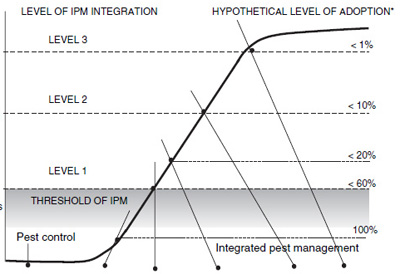|
|
 |
PAGE 57 / 102 |
 |
Unit 2: Applying Ecological Principles
Research and field experience show that pests can be managed successfully with an ecologically based approach. With this approach, agroecosystem managers consciously avoid a single ‘silver bullet’ in favor of multiple tactics that strengthen the system as a whole. These practices primarily focus on creating habitat for a diversity of beneficial organisms.
 |
IPM Continuum. From Conceptual Framework for Integrated Pest Management (IPM) of Tree-Fruit Pests. Kogan, M. and Hilton, R. in Biorational Tree-Fruit Pest Management. Martin Aluja, Tracy Leskey, and Charles Vincent (Eds.) CABI. Cambridge, MA. 2009. |
Ecologically based pest management has a close connection with the concept of integrated pest management (IPM). IPM is a dynamic concept that has come to include a broad range of pest management practices and strategies (including monitoring, field scouting, biological control, the use of economic thresholds and application of pesticides when necessary). How strongly the term IPM applies to a particular farm system can be determined by the type of practices and the level of integration of the strategies being used. Many researchers now refer to an IPM continuum that encompasses multiple levels of pest management integration. Click the image to the right to explore this concept in more detail. Where IPM and ecologically based pest management diverge is in the relative prominence of chemical pesticides as a viable and appropriate strategy for controlling pests.
|